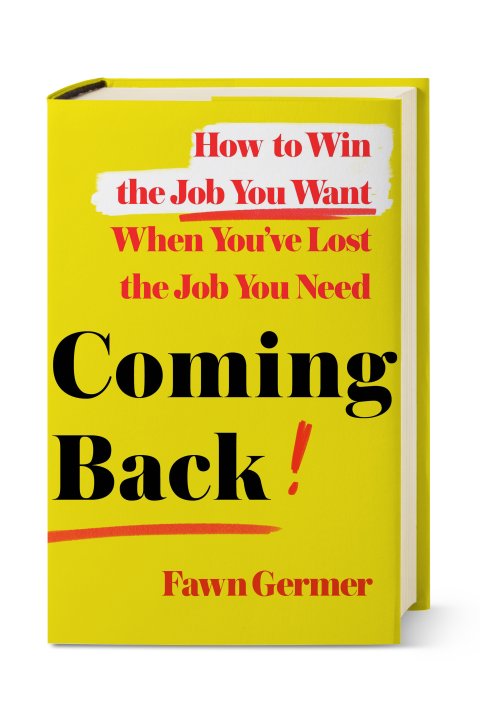According to the Bureau of Labor Statistics year-end report, 2020 ended with 9.8 million fewer jobs than before the pandemic and an unemployment rate of 6.8 percent—much improved from the all-time high of 14.7 percent in April, but a still worrying number with new strains of COVID-19 popping up and the pandemic continuing to wreak havoc on the economy. Four-time Pulitzer Prize-nominee and best-selling author Fawn Germer tackles strategies for getting back to work after a job loss or work gap and renewing your career in her new book, Coming Back: How to Win the Job You Want When You've Lost the Job You Need (St. Martin's Press, January). At a time when employment is precarious for so many, Germer's practical advice for staying relevant is welcome. In this excerpt, she discusses how to get started on the job hunt, the importance of upskilling and how to help insulate yourself from a layoff in the first place.

Choosing to Win
The economy has collapsed on me three times in the last 30 years. There was 9/11, the Great Recession of 2008, and now there is the COVID-19 pandemic. Eventually something else will happen; it will be big, people will face great fear and hardship, and you will wonder what you need to do to make it to the other side.
There will be times when you will be forced by circumstance to regroup and, perhaps, start over. Whether the crisis is a pandemic, terrorist attack, hurricane, flood, wildfire, an economic collapse or something personal, it is on you to get it together and find your strongest self as quickly as possible.
Always remember: your greatest opportunity to succeed occurs in moments when everybody else is giving up.
It might appear unseemly to focus on winning at a time when people are sick, dying and in financial ruin. But what is your other choice? To curl up in a fetal position, glued to cable news and waiting for the end of days? Life is going to go on. Every crisis ends. Not thinking about how you are going to prevail on the other side of it is foolish.
Granted, if your house is the one that loses its roof in a hurricane, you have to deal with that rather than plot out career strategies. But unless you are a direct victim, get it together and get on with things. Figure out the steps you need to take. Write down the people you need to call. Then do the steps and call the people!
Are you going to wait until things get "back to normal," then figure it out? The people who act quickly reap the rewards. How are you going to emerge from the crisis as a go-to player at work? How are you going to be positioned to be the first hired?
The pandemic has pushed people to the brink, but anyone stuck at home and who is not sick has a ton of time to get in shape and take classes that will upskill them and prepare them to rise above coworkers or other job applicants. You can upskill instantly—for free or minimal cost—at many online learning sites (my favorites are edx.org and coursera.org).
And yet most people are still sitting at home wondering what the hell happened and what is going to happen next.
What a waste of time!
No News Is Good News
If you want things to look bleak, watch the news. If you want things to look hopeless, keep watching the news. But if you want to maintain control over your sanity, tune it out.
Yes, you are being encouraged to institute a partial-news blackout in tough times by someone who lived, breathed and loved her first career as a journalist.
In times of national crisis, you have to take charge of your news intake or it will take charge of you.
When all the news is bad, it makes you feel bad. Decide how much you need to read or watch in order to be informed, but not consumed by it. You don't need every little detail and you don't need to know what 20 pontificators have to say about the latest development. You can check it once a day, once every two or three days, and maybe once a week if you can discipline yourself. If something important happens that you absolutely must know, you'll know it—either because someone will tell you about it or you'll see it on social media. But the more you watch, the more the problem grows inside of your brain.
The constant coverage distorts reality. When you see headlines warning that the unemployment rate may hit 16 percent—yikes! How does that make you feel about your chances of applying for and getting a job?
What does your brain do when you constantly read about people dying, going broke, unable to afford food, being laid off en masse? It creates the worst possible reality for you—one that doesn't even exist.
If you tune it out (or at least way down), your brain can control its own perspective. Minimizing exposure helps you process these circumstances to your best advantage.
Power Networking in Crisis
Technology makes it so easy to connect with others in a meaningful way during a crisis. That's why it is so easy to collaborate from home from our computers and phones. The lockdown wasn't a roadblock to networking; it was an open invitation to get serious about it! At the beginning of the pandemic, I sent texts to so many people in my network, and we all had endless time to catch up and deepen our friendships. I knew nobody was doing anything and with a Zoom invite, we were suddenly all together, in living color, having our wine, catching up and enjoying a great moment of friendship.
Look at the people you know and start making contact with everybody. Brainstorm together. You support them; they support you. Whether you are stuck at home or things are more normal, you can always Zoom them. FaceTime them. Do whatever you can to keep the friendship going strong.
Let them know what you are struggling with and ASK FOR HELP.
Be Part of the Solution
When companies are in crisis, they need leadership and contribution. What a great time to stand up and lead. Your greatest contribution can come when you see a problem and know how to fix it. The greatest way to expand authority is to volunteer to solve an unmet need.
Basically, you stepping up and fixing something means your boss doesn't have to do it. So keep your eyes open for any opportunity to contribute more.
Do you see ways to do something differently that will save money or time? Do you know of ways to attract more business or generate more revenue? Are there other problems you can solve? Speak up. Step up. Do it.
Even if you don't have an idea, you do have the ability to make it clear that you want to be a go-to contributor during the crisis and are ready to volunteer to do more. This makes you stand out. If you need to remind leadership of your special skills and abilities, do it.
Be seen as part of the solution—not the problem. This may not insulate you from a layoff, but it will certainly help.
Make it clear that you are embracing change and work harder than you have ever worked. Hyperperformance will separate you from the others, and those who deliver generally give themselves good job security.
Just overdeliver, overdeliver, overdeliver. It's your time to shine.

Always Be Prepared
Don't just sit there waiting for your company to toss you out. Always be ready for anything.
Have your resume, cover letter, and wardrobe ready for your intense networking and job search. Identify the companies where you want to look for jobs and know that, among all the many people who will be looking for jobs, you are more organized and your brain is in the game.

Continued learning shows that you are insatiably curious and taking responsibility for staying relevant. That makes you a very attractive candidate. In addition to doing things like reading (The Wall Street Journal, Harvard Business Review, Inc., Fast Company) or taking continuing education courses (you could choose a class on Artificial Intelligence from Columbia or a class in innovation from MIT), if you are searching in a time when everyone is searching, you will also need a sense of calm and a sense of humor. It's going to be a tough, wild ride, but the person who will be victorious will know with certainty that they will prevail.
I know it is hard to stay calm when your financial situation is precarious or your finances are in ruin. It's difficult to have a sense of humor when you try, try, try and get rejected at every turn. But you know that your attitude drives happiness and success. If you mentally make the decision to stay in the game, stay in it. Be good to yourself. Know that "this too shall pass." If you know it, it will be your truth.
→ Excerpt adapted from COMING BACK: How to Win the Job You Want When You've Lost the Job You Need. Copyright © 2021 by Fawn Germer and reprinted by permission of St. Martin's Press.











